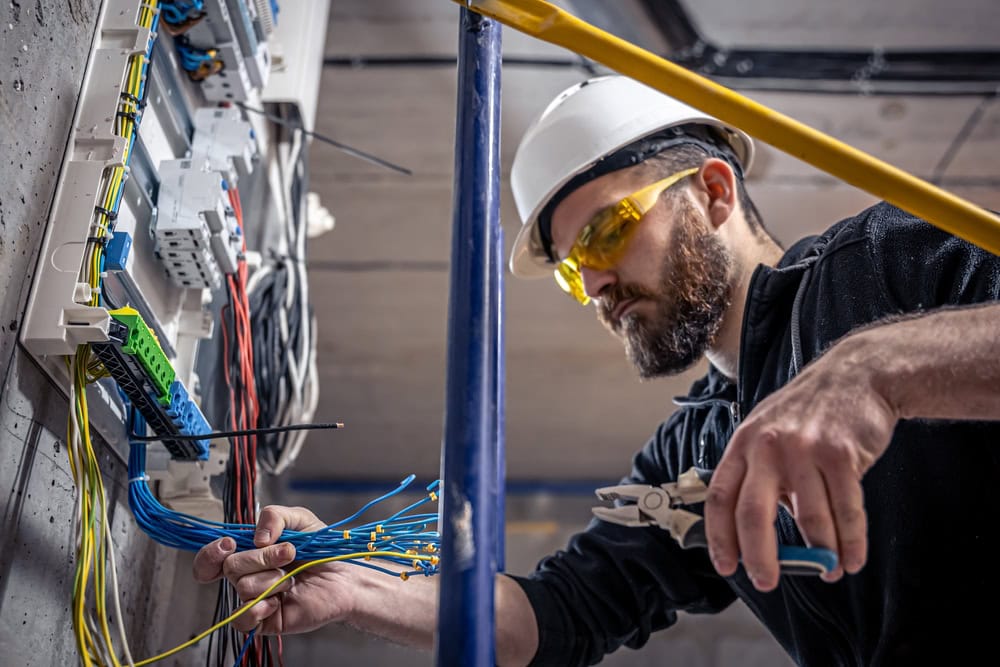We’re back again with another license guide for aspiring contractors. This week, we’ll cover one of the most coveted contractor’s licenses in the state of California: The C-10 electrical contractor’s license.
This license is, as you might guess, critical to anyone doing high-voltage electrical work in California. That goes for almost any commercial and residential job in the State.
Unless you want to work solely on low-voltage electrical systems – as C-7 Low Voltage Systems contractors do – you’re going to need a C-10 electrical license to work as an electrician in the state of California.
Considering the serious consequences of unlicensed contractor work, a C-10 license is the first step any electrician must take when working in the state.
What Does an Electrical Contractor Do?
An electrical contractor is an electrician – any professional responsible for designing, installing, maintaining, and repairing electrical systems in residential, commercial, and industrial properties throughout the state.
While a C-10 license holder usually works on high voltage (more than 91 volts) systems, they may also perform low voltage work usually reserved for C-7 license holders. They ensure that all electrical work complies with state and local codes and standards.
What is a C-10 Electrical Contractor License?
The C-10 Electrical Contractor License is a certification issued by the California State Licensing Board (CSLB) that allows individuals, partnerships, or corporations to legally undertake high-voltage electrical work in California.
This license covers the installation, erection, or connection of electrical wires, fixtures, solar photovoltaic cells, appliances, and more. Basically, you need a C-10 electrician’s license when you work on any systems which “generate, transmit, transform, or utilize electrical energy in any form or for any purpose”, as per the CSLB.
Who Needs a C-10 License?
Any electrician, sparky, electrical contractor, or anyone working on electrical systems over 91 volts needs a C-10 license.
Anyone planning to perform electrical work in California where the total cost (including labor and materials) exceeds $500 must obtain a C-10 license. This includes contractors, subcontractors, and specialty contractors involved in electrical work.
Technically you only need a C-10 license if you’re doing work that costs over $500 for labor and materials – but let’s be honest, if you’re interested in becoming an electrician or getting an electrical contractor’s license, you’re not doing it for the small jobs.
Pretty much any job you’re working on as an electrician is going to cost more than $500, so get a C-10 license if you want to be an electrician in California.
How to Get a C-10 License in California?
To obtain a C-10 license, you must:
- Possess a minimum of four years of journeyman-level experience in electrical work.
- Pass the C-10 Electrical Contractor License Exam, which includes a Law and Business section and a C-10-specific section.
- Submit all necessary documentation, including fees, contractor’s bond, liability insurance, and more.
- Undergo a background check and submit fingerprints for a criminal history review.
Difference Between a C-10 and C-7 Contractor License
The C-10 license is specific to electrical contractors and covers a broader range of electrical work, including high-voltage installations. The C-7 license is for low-voltage systems contractors who work with systems that do not exceed 91 volts.
C-10 license holders can work on jobs typically designated for C-7 license holders. This includes small jobs like low voltage lights for decks and patios, cable installations, surround sound system installs, gates and garages, and so on.
Key Duties of a C-10 Contractor
Key responsibilities of a C-10 contractor include:
- Planning and estimating electrical projects.
- Installing and maintaining electrical systems.
- Collaborating with other departments to ensure quality.
- Ensuring compliance with safety and code requirements.
- Troubleshooting and repairing electrical issues.
- Wiring. Lots of wiring.
What Licenses Are Good To Combine With A C-10 Contractor License?
Considering how important electricity is in today’s world, electrical contractors may be involved in all kinds of different construction jobs. In many cases, you may wish to add another license to help take advantage of your broad – but specific – knowledge. Some great licenses to pair with a C-10 contractor license include:
- Class B-General Building Contractor: This classification allows contractors to work on a wide range of construction projects, including residential and commercial buildings. Having both C-10 and Class B licenses enables contractors to offer integrated services, such as installing low-voltage systems during new construction or renovation projects.
- C-20 HVAC Contractor: To quote the Adam Sandler classic Big Daddy, electricians and HVAC go together like lamb and tuna fish. Considering the electrical load that HVAC systems demand, a C-20 license is great for electricians who want to seamlessly expand into heating, ventilation, and air conditioning services. Especially as we look forward in 2024 – HVAC will continue to be in high demand.
- C-46 Solar Contractor: As electrical contractor’s licenses technically cover “photovoltaic electrical systems”, the C-10 license dovetails nicely with the booming field of solar installation. The C-46 license explicitly allows you to work on solar systems, and the C-10 license lets you rig them up with juice.
Common Types of Jobs for a C-10 Contractor
Jobs typically handled by C-10 contractors include:
- Electrical system installations for new construction.
- Upgrading electrical panels and systems in existing buildings.
- Installing lighting and electrical fixtures.
- Wiring for home automation and security systems.
- Maintenance and repair of electrical systems.
For more detailed information on obtaining a C-10 Electrical Contractor’s License in California, refer to the official Contractors State License Board (CSLB) website and other reliable sources in the field.

